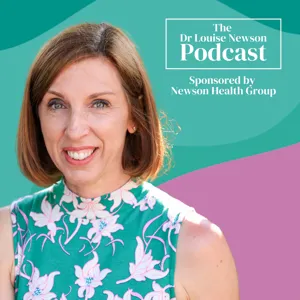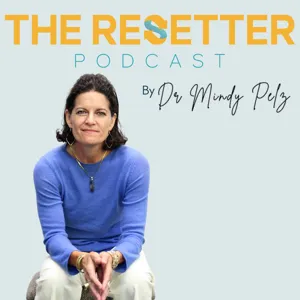Podcast Summary
Importance of timely and accurate menopause diagnosis: Effective communication between patients and healthcare professionals is crucial for accurate menopause diagnosis. Patients should advocate for themselves and seek a second opinion if needed.
Learning from this podcast episode is that timely and accurate diagnosis of menopause is crucial, but not always straightforward. Jo shared her personal experience of experiencing a heavy bleed while on holiday, which led her to seek medical help. However, her GP initially misdiagnosed her and dismissed her symptoms, advising against Hormone Replacement Therapy (HRT) due to her age. This experience highlights the importance of open communication between patients and healthcare professionals, and the need for healthcare providers to consider all symptoms and not just the absence of specific diagnostic markers. It also emphasizes the importance of patients advocating for themselves and seeking a second opinion if they feel their concerns are not being addressed adequately.
Unexplained symptoms during menopause could be related: Persist in seeking answers for unexplained symptoms and advocate for yourself with healthcare providers.
Menopause symptoms can vary greatly from person to person, and what may seem like an unrelated symptom, such as vertigo, could be a menopause-related issue. In this case, the woman experienced vertigo for over a year, which worsened before her period. She also dealt with other symptoms like hair loss, dry skin, and dry eyes. Despite her doctor's initial belief that it was depression, she eventually learned that these symptoms were a result of Sjogren's syndrome, an autoimmune condition that affects the glands that produce tears and saliva. This experience highlights the importance of persisting in seeking answers for unexplained symptoms and advocating for yourself with healthcare providers.
Misdiagnosis of Menopause Symptoms: Menopause can present with a wide range of symptoms, often leading to misdiagnosis and ineffective treatments. Recognizing the complexity and diversity of symptoms and ensuring accurate and timely diagnosis is crucial for effective treatment.
The menopause transition can present with a wide range of symptoms that may not be immediately associated with menopause, leading to misdiagnosis and ineffective treatments. The woman in this discussion experienced various symptoms including joint pain, dry mouth, itching, and discomfort in her vagina and nose. She went through multiple rounds of antidepressants, nerve pain medication, and even dental procedures before being diagnosed with menopause. Her symptoms worsened over time, and she found relief only after being prescribed Hormone Replacement Therapy (HRT). This experience highlights the importance of recognizing the complexity and diversity of menopause symptoms and the need for accurate and timely diagnosis and appropriate treatment.
Advocating for oneself during menopause: Seek support from loved ones, be persistent with healthcare professionals, and adapt treatment plans for optimal relief during menopause.
When an individual's quality of life reaches a point where they feel they can no longer cope, it's crucial to advocate for oneself and seek help from healthcare professionals. The speaker's story illustrates the importance of having a supportive network, as her daughter's intervention led her to receive appropriate treatment for her menopause symptoms. Despite following medical advice and trying various medications, the speaker's condition worsened, and it took a change in approach and a compassionate healthcare provider to ultimately provide her with the relief she needed. The experience highlights the importance of listening to patients, considering their unique circumstances, and adapting treatment plans accordingly.
Menopause and Post-Pregnancy Hormonal Imbalances: Hormonal changes during menopause and post-pregnancy can lead to various symptoms and impact overall well-being. Proper diagnosis, understanding, and treatment, including HRT absorption and dosage adjustment, are crucial for effective management.
Hormonal imbalances during menopause and post-pregnancy can significantly impact a woman's mental and physical health. The speaker in this discussion shared her experience of struggling with menopausal symptoms for months after giving birth, despite feeling great during pregnancy. Her healthcare provider explained that her high estrogen levels during pregnancy had depleted her estrogen stores, leaving her in a "mini-menopause" state after delivery. The healthcare provider also emphasized the importance of proper hormone replacement therapy (HRT) absorption and dosage adjustment to effectively manage menopausal symptoms. The speaker's journey to find relief from her symptoms, including hot flashes, burning mouth, and depression, highlights the importance of recognizing the connection between hormonal changes and overall well-being. Proper diagnosis, understanding, and treatment can help women navigate these challenging transitions more effectively.
Personal journey with HRT during menopause: Finding the right HRT method and dosage can significantly improve menopause symptoms and overall quality of life. Patience and advocacy for oneself are key in the process.
Hormone replacement therapy (HRT) can be a game-changer for women experiencing menopause symptoms, even if they don't notice any obvious changes. The speaker in this discussion shares her experience of trying different forms of HRT, including patches and testosterone, to manage her symptoms and improve her quality of life. She emphasizes the importance of finding the right method and dosage for each individual, as everyone's experience of menopause is unique. The speaker also shares that it took time and patience to find the right combination of medications and dosages, but the results were worth it. She encourages women to keep advocating for themselves and seeking help from healthcare professionals if they are struggling with menopause symptoms. It's important to remember that even if symptoms are not immediately noticeable, they can still be affecting the body in ways that are not visible, such as bone health or cognitive function.
Hormonal Imbalances in Menopause: Hormone Replacement Therapy (HRT) can provide relief from debilitating menopause symptoms for some women, but individual circumstances and preferences should guide the decision-making process.
Hormonal imbalances, particularly in women approaching menopause, can have profound effects on both physical and mental health. These effects can be debilitating and may not respond to traditional treatments. Hormone Replacement Therapy (HRT) has been a game-changer for some women, providing relief from symptoms and improving overall quality of life. However, it's essential to remember that HRT is not for everyone, and individual circumstances and preferences should guide the decision-making process. The risks associated with HRT are often exaggerated, and the benefits can be significant for some women. Ultimately, it's crucial for patients to be fully informed and involved in the decision-making process with their healthcare providers.
Women's healthcare choices matter: Ensure women's voices are heard in healthcare consultations, prioritize education for professionals and women, and recognize the importance of informed decisions in healthcare
Women's choices in healthcare, particularly regarding hormone replacement therapy (HRT), should be prioritized. The speaker shared her personal experience of being denied HRT, leading to significant distress and health issues. She emphasized the importance of education for both healthcare professionals and women to recognize the symptoms and advocate for themselves. The financial implications of prolonged consultations and medication usage for untreated conditions were also highlighted. Unfortunately, stories like this are not uncommon, and it is crucial to ensure that women are central to consultations and allowed to make informed decisions about their healthcare.
Encouraging Women to Track Symptoms, Educate Themselves, and Open Up About Menopause: Encouraging women to use a period tracking app, self-educate, and openly discuss menopause symptoms can significantly improve their experience during perimenopause and menopause stages.
If you notice changes in yourself or someone you know, particularly women, and they mention struggling with new symptoms or medication, it's essential to encourage them to use a period tracking app, educate themselves about their body, and open up about their experiences. This could potentially be life-changing, especially during the perimenopause and menopause stages. Jo, a guest on this podcast, shared her personal journey of dealing with perimenopause symptoms and how these three actions could have made a significant difference for her. Having a period tracking app like Balance can help women log and monitor symptoms, making it easier to identify patterns and changes. Self-education through evidence-based resources is crucial to understanding what's happening to the body. Lastly, talking openly about these experiences can help normalize the conversation around menopause and encourage others to seek help and support. For more information and resources, visit balance-menopause.com or download the free Balance app.





